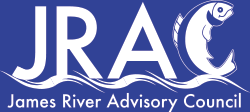Photos for media use: https://www.flickr.com/gp/pcopros2/2sk8u9. Please credit James River Advisory Council.
More than 700 volunteers in 12 jurisdictions today cleaned the James River — and its banks — of trash and recyclables during the 17th annual James River Regional Cleanup.
In all, 492 bags of trash and 316 bags of recyclable material were removed from 17 sites between Lynchburg and Newport News. The annual event is organized by the James River Advisory Council and its many partners, including nonprofit organizations, friends groups, businesses, local governments, state agencies and individuals.
“I’m always amazed and thrilled at how many dedicated volunteers we have to help with this event,” JRAC Executive Director Kimberly Conley said. “We’re tremendously grateful and thank all of the volunteers and dedicated partners who have made the James River Regional Cleanup a success for another year.”
Of the 732 volunteers, 34 were in canoes or kayaks and nine were in powerboats. Other volunteers scoured the riverbanks for debris or picked up along roadsides. They pulled 108 tires from the water. Some unusual items that were found were: a raccoon skull, a record player, a lampshade, a bowling ball and a coconut.
The James River Regional Cleanup is the kickoff for James River Week during which numerous activities and programs are offered to help people celebrate the river. See the James River Week calendar.
For more information, call 804-748-1567 or email conleyk@chesterfield.gov or julie.buchanan@dcr.virginia.gov.
About JRAC: The James River Advisory Council provides a forum for the diverse interests along the James River in Central Virginia and engages the public about issues and challenges facing the river. JRAC’s vision is a healthy, beautiful, economically vital and accessible James River that is cared for by a diverse and engaged community that acts on its behalf.
JRAC’s membership includes representatives from local jurisdictions, businesses and industry, civic organizations and individuals. By leading discussions about the river, and hosting regional events and programs, the council sets the tone for positive and interactive relationships among partners throughout the region.
# # #

